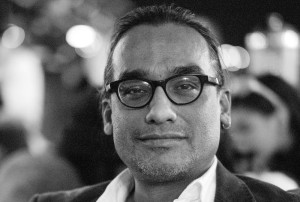Partho Sen-Gupta’s Sunrise makes its mark at SFF
By Neeru Saluja
In India, 100,000 children go missing every year. Half of them haven’t even been found as yet. Most of these children end up in human trafficking and are sexually exploited.
While the statistics are shocking, imagine what the parents go through when their child is kidnapped. A missing child is a parent’s worst nightmare. The endless trips to the police station, the tiring search, the never ending hope of finding their child, and prayers for their child to be safe.
Director Partho Sen-Gupta has shown the pain and anguish of a parent in his film Sunrise. A psychological drama set in dark Mumbai, the film unleashes the psyche of a police inspector whose young daughter has gone missing. The captivating noir shifts between dream and reality, rain and light, a deluge of darkness and the dream of a sunrise.
With sold out shows at the Sydney Film Festival, Partho Sen-Gupta has nailed it. Sunrise, an Indo-French production premiered at the Busan International Film Festival and was subsequently selected at the 2015 Mumbai Film Festival, Dharamshala Int. Film Festival, the Amsterdam Film Festival and has recently been selected for the Munich International Film Festival.
Born and brought up in Mumbai, Partho has now made Sydney his home. Before directing films, he was a famous art director. We talked to him prior to the Sydney Film Festival and after watching the film, we were left mesmerised by his sensitive direction.
Sunrise touches a very sensitive topic. What is the inspiration behind Sunrise?
Sunrise is a personal story. When I was seven years old, some people tried to kidnap me. Thank God they were unsuccessful, as friends and construction workers started shouting. I was saved but the incident started working on my mind. Children can be nasty and their comments such as ‘they could have broken your legs’ or ‘you could have been begging outside the temple’ left an everlasting impression on me.
Then my daughter was born and all the memories came back. When I started to research about kidnapping, I stumbled upon a Government report which said 100,000 children were found missing in 2013-14. That’s scary and crazy. I also picked up a lot of information from the press. Then I started writing Sunrise. My film is about the parent’s pain of losing a child. The story is treated in a ‘noir fashion’.
Actor Adil Hussain carries the full film on his shoulders. What made you choose him as the main protagonist?
It is difficult to cast a 40 plus age actor in India. They are either not fit or they act in serials. Few actors I knew couldn’t give me a month. Irfan Khan was a choice but he is too big so I didn’t want to approach him. When I saw Adil, he looked perfect for the role of an inspector. As he walked in, I knew he was the actor I was looking for. In the film, he hardly has any dialogues. He uses his body language to act. It’s a tough role to play but he was keen to do it. During the shoot, we knew exactly what would happen. It was perfect.
And did you always have Tannishtha in your mind for the wife/mother’s role?
Tannishtha is a good friend and a very talented actor. She was the actress in my first film. She suggested Adil to me. She has a very small but difficult role. Even she hardly has any lines. She plays the role of a mother who is suffering. Her look is deglamourised – no dress change and she didn’t even wash her hair for two weeks. Adil is always loving to her but she shifts lots of metres. Their relationship is strange and it shows how a child takes a pivotal role in a couple’s life.
It’s incredible how despite a few lines the actors tell us the whole story. How did you achieve this?
The film is not very verbal, most of the acting is with the eyes. There is no violence or abuse throughout the film, though the film is about abused children. My actors had a lot of faith in me and we shot the complete film in Mumbai except for the last beach scene in Goa. My desire is to tell a film and attract a certain kind of audience. It’s not the normal style of storytelling. It’s a more reflective approach.
The film is realistic and artistic. Did your background of art direction help in directing the film?
I have worked in films like Mr India and Sagar as an assistant art director but these films gave me the technical background. I learnt the intellectual aspect in my Film school in France.
Your film is gaining a lot of attention at international film festivals. Do you think Indian filmmakers have finally opened the doors to a global audience?
Filmmakers are opening the roads. Though it’s still a constant fight to tell people that Indian films are not about dancing. The doors are opening. Lunchbox’s director Ritesh Batra is directing a British film, which is an interesting development. We are not moving away from India, but the world needs to know more about our talent. We will move forward when an Australian director can direct a film in United States.
Short URL: https://indiandownunder.com.au/?p=5019

